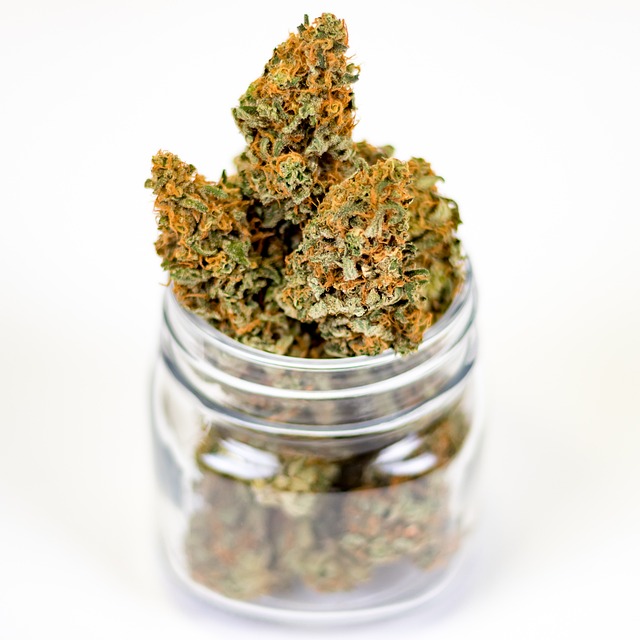The THCA flower, a source of Tetrahydrocannabinolic Acid (THCA), has been recognized for its therapeutic benefits, particularly in managing anti-nausea symptoms. Its efficacy is linked to its interaction with the endocannabinoid system's CB1 and CB2 receptors, which play a role in regulating nausea and vomiting. THCA flower's anti-nausea effects are also attributed to its ability to activate TRPV1 receptors and exhibit anti-inflammatory properties, which may reduce gut inflammation associated with nausea. Unlike delta-9-THC, THCA does not induce psychoactive effects, making it a valuable option for those seeking relief from nausea without mind-altering side effects. Clinical studies are ongoing to further establish its efficacy, but initial findings suggest that THCA flower could be an effective natural remedy for anti-nausea treatment, offering significant relief for users. It is important for individuals to consult with healthcare professionals before using THCA flower as part of their health regimen to ensure proper guidance and safe usage based on their individual health needs.
Exploring the therapeutic potential of THCA flower, a non-psychoactive cannabinoid, this article delves into its anti-nausea effects and mechanisms. From its emergence as a natural remedy to its interactions within the endocannabinoid system, we uncover the scientific evidence that supports THCA’s efficacy against nausea. As we navigate through its potential applications in medicine and alternative therapies, we also address the importance of understanding and adhering to safe dosage considerations to ensure optimal health outcomes. Furthermore, this piece compares THCA flower’s anti-nausea effects with synthetic cannabinoids and conventional antiemetics, providing a comprehensive overview of its role in nausea management. Additionally, we explore the spectrum of potential side effects associated with THCA consumption, offering guidelines to mitigate risks and manage adverse reactions. With an eye towards the future, this article also highlights the need for ongoing clinical trials and research to further elucidate the benefits and best practices for utilizing THCA flower, ensuring its safe and effective use for those seeking relief from nausea.
Exploring THCA Flower's Anti-Nausea Effects and Mechanisms of Action

The THCA flower, which contains Tetrahydrocannabinolic Acid, a non-psychoactive cannabinoid precursor to THC, has garnered attention for its therapeutic properties, particularly in the realm of alleviating nausea. Studies have indicated that THCA flower exerts anti-nausea effects primarily through its interaction with the endocannabinoid system. This system, comprising a network of receptors found throughout the body, plays a crucial role in regulating various physiological processes including appetite, pain sensation, and immune response. By binding to cannabinoid receptor type 1 (CB1) and cannabinoid receptor type 2 (CB2), THCA is believed to modulate neurotransmitter release and influence the areas of the brain that control vomiting and nausea. The anti-emetic benefits of THCA flower are thought to be more pronounced in patients undergoing treatments like chemotherapy, where traditional anti-nausea medications may not be fully effective. Users report a reduction in symptoms associated with nausea when administered in appropriate dosages, suggesting that THCA’s potential as an alternative or complementary treatment for nausea is promising and warrants further clinical investigation.
The mechanisms of action through which THCA flower exerts its anti-nausea effects are complex and multifaceted. Beyond its interaction with the CB1 and CB2 receptors, THCA may also influence other pathways involved in the regulation of nausea. For instance, it has been observed to activate TRPV1 receptors, which play a role in sensory perception, body temperature regulation, and inflammation. Additionally, its anti-inflammatory properties may contribute to its anti-nausea effects by reducing gut inflammation, which is often associated with nausea. The therapeutic potential of THCA flower for managing nausea is an area of ongoing research, with scientists aiming to elucidate the full scope of its mechanisms and effects. As such, the evidence thus far supports the use of THCA flower as a promising option for those seeking natural remedies to mitigate nausea.

delta-9-tetrahydrocannabinolic acid (THCA) is a non-psychoactive cannabinoid found in the Cannabis sativa plant that has garnered attention for its potential therapeutic properties, including anti-nausea effects. THCA flower, which contains this cannabinoid in its raw form, is believed to offer these benefits without the psychoactive high associated with its more famous counterpart, delta-9-THC. Studies suggest that THCA may interact with the body’s endocannabinoid system, particularly the CB1 and CB2 receptors, to alleviate nausea and vomiting, which are common symptoms associated with conditions like chemotherapy-induced nausea in cancer patients. The anti-nausea effects of THCA are thought to be due to its ability to stimulate appetite and reduce inflammation, which can also contribute to its overall therapeutic profile. Users who have incorporated THCA flower into their regimen often report a sense of relief from nausea without the disorienting side effects sometimes experienced with other treatments. As with any substance that affects bodily functions, it is important for individuals to consult healthcare professionals before incorporating THCA flower into their health and wellness routine, to ensure safety and appropriate dosing based on their specific health conditions.
In conclusion, the examination of THCA flower’s anti-nausea properties and its underlying mechanisms presents a promising avenue for therapeutic intervention. The potential benefits of incorporating THCA flower into treatment regimens warrant further scientific scrutiny to fully understand its efficacy and optimal application. As research continues, it is clear that the anti-nausea effects of THCA flower hold significant promise for those affected by nausea-inducing conditions. The biological pathways responsible for this effect provide a foundation for developing new and effective treatments, potentially offering relief to individuals in need.
